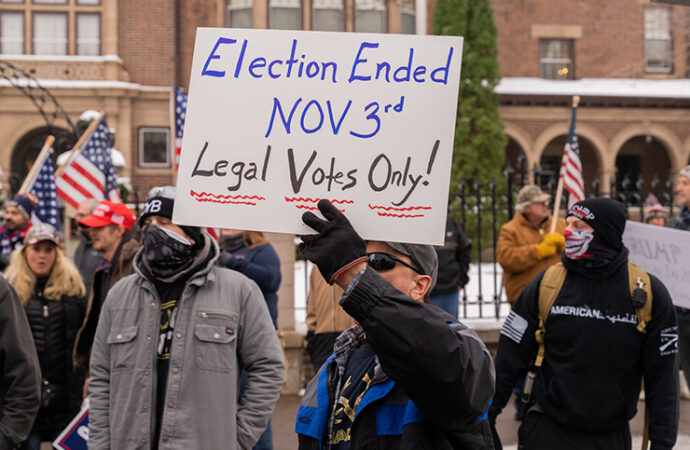I couldn’t believe my eyes.
TIME published an article entitled: “The Secret History of the Shadow Campaign That Saved the 2020 Election.” Having been constantly told by the media in recent months that conspiracy theories and underground movements are bad, one would not be blamed for turning tail and running as far away as possible from such an article, especially in a day when a Congresswoman can be punished by her fellow lawmakers for having entertained conspiracy theories in the past.
Yet there it was. Not only a headline, but a lengthy article from a prominent, long-established arm of the mainstream media claiming and providing evidence of “the inside story of the conspiracy to save the 2020 election, based on access to the group’s inner workings, never-before-seen documents and interviews with dozens of those involved from across the political spectrum.”
Intrigued, I continued to read Molly Ball’s explanation that those who worked in this movement are so proud of their feat that they cannot bear to keep it quiet. They saved the world, this “well-funded cabal of powerful people” from all backgrounds, “working together behind the scenes to influence perceptions, change rules and laws, steer media coverage and control the flow of information.”
In other words, all those claims of a fraudulent election, which we were told were practically treasonous, were… true?
Oh, I’m sorry. Did I say fraud? Silly me. I should have used the alternative f-word: “fortify.” These people “were not rigging the election,” Ball assures us, “they were fortifying it.”
Semantics. They make all the difference.
Ball goes on to say that “the public needs to understand the system’s fragility in order to ensure that democracy in America endures.” In other words, “the system,” or what they refer to as democracy, is all important and can never be questioned, even if lying, cheating, stealing, and mass suppression of information must take place in order to preserve it.
In laying it out bluntly like that, one has to wonder, was “the system” worth all that effort? What kind of government do we really have if, as this article seems to suggest, it has to be preserved by hook or by crook?
Some investigation into the forms of government may be helpful. In this arena the late American political philosopher Russell Kirk offers some clarity, particularly in his exposition of Montesquieu and the influence his writings had on the American founders.
Montesquieu, Kirk writes, sees three main patterns of government: “the republic, the monarchy, and the despotism.” America was established to be a republic, but does this definition still fit our nation? Not exactly. “The republic is sustained by the citizens’ virtue, the monarchy by the king’s honor, and the despotism (like that of the Ottomans) by the subjects’ fear.”
Virtue? Honor? It’s hard to say that either of those traits are characteristics of our nation, particularly after what is written in the TIME article on the election. But fear… now that seems to fit our nation to a tee! Is it possible that our government is one of despotism, even if, as the TIME article insists, democracy has triumphed, and the despot known as Trump has now been kicked out the door?
The allegedly despotic government of the Trump administration has certainly not been replaced with a virtuous one. The strings pulled and moves made by those determined to depose Trump all signal an “end justifies the means” type of government devoid of anything exemplary and upright. It is a power struggle that thumbed its nose at millions of voters, declaring that “the system” knows what’s best for the little peons.
Kirk goes on to say:
Ordinarily a people do not choose one constitutional form or another: they find themselves necessarily under the sort of government which is suited to their social circumstances. In a sense, any people obtain the kind of government they deserve—or, at any rate, the kind of government which their history and their conditions of existence have brought upon them. (Emphasis in original)
This is where we find ourselves. And it is perhaps this realization which brings such a sense of fear over the Average Joes living in Middle America outside of “the system’s” swamp. They are not the stupid ones; instead, they see clearly how their voice has been co-opted by the elite ruling few who claim to know what’s best for the rest of the country, but who have effectually delivered despotism.
History repeats itself, for ironically one of TIME’s former editors, Whittaker Chambers, noted this same theme at work during his testimony against communist spy Alger Hiss. Chambers was the little man, going against the Goliath of the system, while every big and powerful person and organization turned a blind eye to the truth. “It was the enlightened and the powerful, the clamorous proponents of the open mind and the common man, who snapped their minds shut in a pro-Hiss psychosis,” writes Chambers, “of a kind which, in an individual patient, means the simple failure of the ability to distinguish between reality and unreality, and, in a nation, is a warning of the end.”
Ball’s article for TIME gloats over the fact that the elites have prevented the end of the world by “fortifying” the election to suit their purposes. But perhaps such fortifying only shows that we are hurtling toward some type of an end all the more quickly.
—
Dear Readers,
Big Tech is suppressing our reach, refusing to let us advertise and squelching our ability to serve up a steady diet of truth and ideas. Help us fight back by becoming a member for just $5 a month and then join the discussion on Parler @CharlemagneInstitute!
Image Credit:
Flickr-Chad Davis, CC BY 2.0
















Leave a Comment
Your email address will not be published. Required fields are marked with *